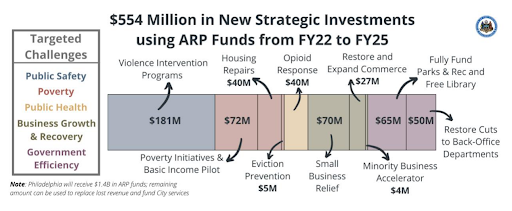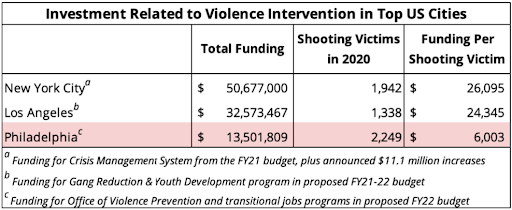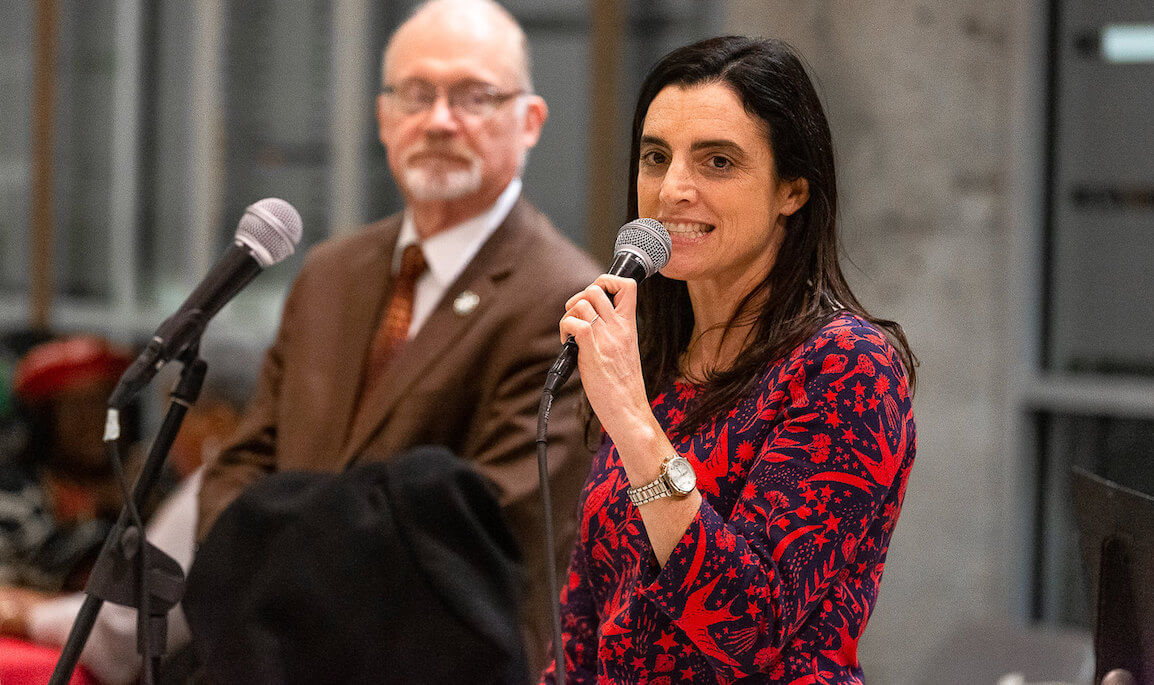Philadelphia is receiving a big cash infusion from the federal government to restore our funding levels and services after the pandemic-induced budget crunch last year, and there are a lot of questions out there about how strategically city elected officials are using that money.
Last week, the Inquirer published an op-ed by Controller Rebecca Rhynhart, in which she sounded the alarm about the Kenney administration’s current approach, and laid out an alternative plan for spending the substantial funds allocated to the City via the American Rescue Plan (ARP).
The op-ed previewed a more substantive plan produced by the Controller’s office, the first purpose-built alternative spending model anybody’s released to date for the $1.4 billion the City will receive from the feds. The ARP allocated $1.9 trillion in Covid recovery funds to state and local governments, and Philadelphia will receive its dollars in two equal tranches, the first this month, and the second this time next year.
MORE ON CONTROLLER REBECCA RHYNHART:
- Rhynhart on the missing millions
- How fast will Philly’s budget recover from Covid?
- New Year, No New Taxes
But the funds don’t expire at the end of 2024, so one of the initial points of tension around spending decisions is whether we ought to frontload spending over the first two years to spur recovery or save some of cash in the case of budget holes down the line. According to sources in City Hall, the general sentiment is that City Council members are largely supportive of a more aggressive short-term spending plan.
The City faced a $749 million budget shortfall during Fiscal Year 2021, which was closed by revenue from tax increases and spending cuts. This current budget season, the Kenney administration projects a $450 million shortfall for the next fiscal year. The Controller’s Office projects a smaller revenue shortfall—$284 million—for FY 2022; however they concede the point for the purpose of this alternative spending plan, and set aside $450 million in FY22, $250 million in FY23, $100 million in FY24, and $40 million for the first half of FY25 in prophylactic revenue gap filling.

Agree or disagree with these recommendations, it’s a refreshing change to see some leadership on the issue from an elected official willing to think about the opportunity presented by this federal windfall more holistically, and try to achieve some specific goals.
That still leaves $554 million in largely discretionary funds. This is largely a blue-sky exercise, since the only real limits to the spending of ARP dollars are prohibitions on spending that doesn’t directly impact residents (e.g. pension obligations or debt service), socking the cash away in rainy day funds, and tax cuts.
The Controller’s Office sets the contours of the spending plan by considering the areas of need in Philadelphia relative to peer cities. This benchmarking produces predictably dismal results, with Philadelphia ranking at or near the bottom of nearly every category. The report also highlights a point which frequently gets glossed over in these discussions: “Prior to the Covid-19 pandemic, the City increased spending by more than $1 billion between FY16 and FY20. Despite this significant increase, resident satisfaction with City services declined.” Clearly some changes are in order.
To that end, the plan sets out to address five core areas of need:
Public Safety: $181 Million
A number of Council members, including Maria Quiñones-Sanchez and Jamie Gauthier, have called for increased ARP spending on gun violence prevention. The Controller’s plan joins that call, and dedicates the largest allocation of recovery dollars to this issue. Specifically, the plan calls for a surge of funding for targeted community intervention programs and a bulked-up internal operation to coordinate and evaluate these programs.

Philadelphia would need to spend an additional $55 million annually to match New York or Los Angeles’s spending levels on violence prevention programs, which this plan proposes as the target the City should aim for.
RELATED: Listen to our podcast about gun violence truths and solutions
Poverty Reduction: $171 Million
The Controller’s plan approaches poverty reduction through two main strategies: direct cash-relief and housing security. On the cash relief front, the Controller recommends a direct-payment pilot of $750 to 2,000 low-income families, totaling $18 million annually, and an evaluation of the program’s efficacy after the first year.
The Controller’s Office sets the contours of the spending plan by considering the areas of need in Philadelphia relative to peer cities. This benchmarking produces predictably dismal results, with Philadelphia ranking at or near the bottom of nearly every category.
The housing piece addresses repairs, rental assistance, and eviction. On the home ownership side, the plan includes a proposed spend of $5 to $10 million per year on funding repairs through the Housing Trust Fund. On the tenant side, the Controller proposes an unspecified addition to the City’s extant Emergency Rental Assistance Program, and an annual investment of $3 million to maintain funding for the City’s highly successful anti-eviction program.
RELATED: Can Free Cash Solve Philly’s Poverty Problem?
Government Efficiency: $115 Million
As the City’s financial watchdog, it’s not surprising to see a focus on government efficiency in the Controller’s ARP alternative plan. Part of this falls into the standard Controller wheelhouse, like decreasing overtime by rightsizing staffing levels and increasing oversight in budgeting.
 Budget wonks have long complained that City doesn’t use its departments’ own performance metrics—many of which demonstrate clear failures to meet their own modest goals—when allocating funds as part of the normal budgeting process. Instead, departments just get regular increases, without any evaluation as to whether those funds translate to quality city services. As with overtime reduction, the Controller calls for savings through performance-informed budgeting.
Budget wonks have long complained that City doesn’t use its departments’ own performance metrics—many of which demonstrate clear failures to meet their own modest goals—when allocating funds as part of the normal budgeting process. Instead, departments just get regular increases, without any evaluation as to whether those funds translate to quality city services. As with overtime reduction, the Controller calls for savings through performance-informed budgeting.
On the spending side, the plan’s focus is on reversing the pandemic-induced austerity budgets of the last two years (and, really, since the budget cuts of the Great Recession). To that end, the Controller’s office calls for the restoration of pre-pandemic funding levels for the Free Library, Parks and Recreation, Human Resources, Fleet Management, Public Property, Procurement, and Records, totaling $16 million.
RELATED: The Fix: How About an Open, Transparent Government Run By… You?
Business Recovery and Growth: $101 Million
Post-pandemic business recovery has proven to be the most fraught budgeting terrain. Some City Council members have pushed back on the Mayor’s proposed BIRT and Wage tax cuts for being alternately too modest or too generous, and questions of what even qualifies as permissible ARP spending under the federal law haven’t been settled.
Within that landscape, it’s not a surprise that the Controller’s plan plays it down the middle, with a focus on equity and helping minority-owned businesses via spending in three areas: a targeted $70 million expansion of the City’s Small Business Relief Fund, $1 million a year to stand-up a Minority Business Accelerator, and the restoration of Commerce’s pre-pandemic budget. Given the opportunity to spend free federal money, we’d like to see some investment in process reforms too that could unlock more new business activity in the city.
At this level of investment, for example, the City could fix its broken new business processing system and adopt something like New York City Mayoral candidate Kathryn Garcia’s “Single Form” plan. As the Garcia campaign explains it: “Any new business with less than 100 employees will be able to fill out just one simple, streamlined permit to get up and running. You will be able to apply for that City Permit on your smartphone. Any new or returning business that applies for a City Permit will get a response within 1 month of submitting the application.”
RELATED: It’s time to focus on jobs in Philly
Public Health: $40 Million
The final piece of Controller’s ARP plan focuses on post-pandemic public health needs, specifically the city’s spiraling opioid crisis. Building on the City’s 2021 action plan for the Opioid Response Unit, which allocates $500,000 to the issue, this plan would allocate $5 to $10 million with new ARP spending to improve access to treatment and other behavioral healthcare services.
Agree or disagree with these recommendations, it’s a refreshing change to see some leadership on the issue from an elected official willing to think about the opportunity presented by this federal windfall more holistically, and try to achieve some specific goals.

The Citizen is one of 20 news organizations producing Broke in Philly, a collaborative reporting project on solutions to poverty and the city’s push towards economic justice. Follow the project on Twitter @BrokeInPhilly.
Jon Geeting is the director of engagement at Philadelphia 3.0, a political action committee that supports efforts to reform and modernize City Hall. This is part of a series of articles running on both The Citizen and 3.0’s blog.
Header Photo: Philadelphia Controller Rebecca Rhynhart. Photo by Jared Piper / Flickr



